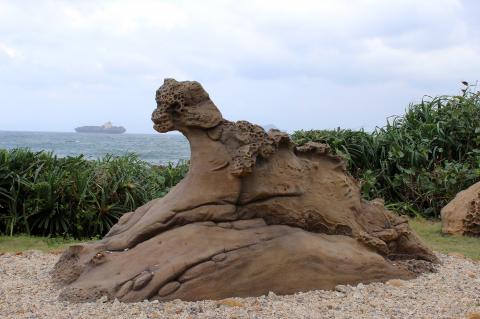Duplicates of rock formations named “Leopard (金錢豹)” and “Cute Princess Rock (俏皮公主)” were installed at the renowned tourist site of Yehliu Geopark (野柳地質公園) in New Taipei City (新北市) on Wednesday in an effort to attract more visitors.
Yehliu Geopark deputy general manager Tang Chin-hui (湯錦惠) said most people know about the iconic “Queen’s Head (女王頭)” rock formation at the park, but relatively few know about the “Leopard” rock formation.
“Due to tidal fluctuations, this [“Leopard”] unique feature was visible for only 18 days in a year,” she said, adding that it could usually be viewed on the first three days and also on the 15th to 17th days of the third, fourth and fifth months of the lunar calendar.

Photo: Yu Chao-fu, Taipei Times
However, the Leopard rock formation collapsed amid pounding waves during a typhoon in 2010, she said, adding that the park management therefore decided to build a replica, along with a reproduction of the “Cute Princess” rock formation.
According to Tang, building the replicas was not a easy job, as workers had to carry computer equipment weighing more than 100kg along the seashore to the edge of the cape in order to perform laser scanning of the collapsed remnants of the Leopard rock. The data was then compiled to enable the construction of a 3D digital image, used to make polyurethane mouldings, she said.
These mouldings were then processed via a computer numerical control machine to produce a one-to-one replica of the original, which was augmented on the exterior with fiber reinforced plastic.
The replica then underwent a final treatment by craftsmen that included fine detailed finishing, paint coloring and imitation sandstone surface polishing, she said
Last year, the park also had a duplicate of the “Queen’s Head” made, Tang said, adding that it has proven to be popular with tourists, who like to have their pictures taken with it.

Chinese Nationalist Party (KMT) Chairman Eric Chu (朱立倫), spokeswoman Yang Chih-yu (楊智伃) and Legislator Hsieh Lung-chieh (謝龍介) would be summoned by police for questioning for leading an illegal assembly on Thursday evening last week, Minister of the Interior Liu Shyh-fang (劉世芳) said today. The three KMT officials led an assembly outside the Taipei City Prosecutors’ Office, a restricted area where public assembly is not allowed, protesting the questioning of several KMT staff and searches of KMT headquarters and offices in a recall petition forgery case. Chu, Yang and Hsieh are all suspected of contravening the Assembly and Parade Act (集會遊行法) by holding

PRAISE: Japanese visitor Takashi Kubota said the Taiwanese temple architecture images showcased in the AI Art Gallery were the most impressive displays he saw Taiwan does not have an official pavilion at the World Expo in Osaka, Japan, because of its diplomatic predicament, but the government-backed Tech World pavilion is drawing interest with its unique recreations of works by Taiwanese artists. The pavilion features an artificial intelligence (AI)-based art gallery showcasing works of famous Taiwanese artists from the Japanese colonial period using innovative technologies. Among its main simulated displays are Eastern gouache paintings by Chen Chin (陳進), Lin Yu-shan (林玉山) and Kuo Hsueh-hu (郭雪湖), who were the three young Taiwanese painters selected for the East Asian Painting exhibition in 1927. Gouache is a water-based

Taiwan would welcome the return of Honduras as a diplomatic ally if its next president decides to make such a move, Minister of Foreign Affairs Lin Chia-lung (林佳龍) said yesterday. “Of course, we would welcome Honduras if they want to restore diplomatic ties with Taiwan after their elections,” Lin said at a meeting of the legislature’s Foreign Affairs and National Defense Committee, when asked to comment on statements made by two of the three Honduran presidential candidates during the presidential campaign in the Central American country. Taiwan is paying close attention to the region as a whole in the wake of a

OFF-TARGET: More than 30,000 participants were expected to take part in the Games next month, but only 6,550 foreign and 19,400 Taiwanese athletes have registered Taipei city councilors yesterday blasted the organizers of next month’s World Masters Games over sudden timetable and venue changes, which they said have caused thousands of participants to back out of the international sporting event, among other organizational issues. They also cited visa delays and political interference by China as reasons many foreign athletes are requesting refunds for the event, to be held from May 17 to 30. Jointly organized by the Taipei and New Taipei City governments, the games have been rocked by numerous controversies since preparations began in 2020. Taipei City Councilor Lin Yen-feng (林延鳳) said yesterday that new measures by